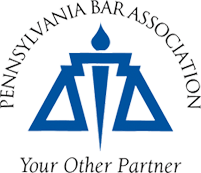HARRISBURG (March 13, 1997) -- Pennsylvania Bar Association President James F. Mundy
today pledged to do "whatever it takes" to preserve the integrity of the
PBA-sponsored Pennsylvania Judicial Evaluation Commission, in response to a lawsuit asking
the court to order the PBA to turn over the Commission's confidential documents.
"Once again, this citizens' commission has come under attack," said Mundy.
"Since the critics didn't like the ratings, they are now trying to discredit the
process and the people on the Commission."
The suit, filed by Attorneys Richard Sprague of Philadelphia, William Lamb of Chester
County and Alvin Lewis of Lancaster, is claiming that as PBA members, they have a right to
see the confidential records of the Commission.
"This Commission is an independent group of nine lawyers and nine laypersons
dedicated to providing voters with information on the men and women running for election
to our highest courts," Mundy said. "Confidentiality is critical if they are to
have candid interviews with lawyers, judges and clients who have in-depth knowledge
concerning the candidates. We will not be bullied by the political bosses, but will stand
firm in our commitment to support the Commission's process and findings."
Mundy also took exception to the attorneys' concerns with laypersons on the Commission.
In the lawsuit, Sprague et al., state that they "have grave concerns about the
ability of the Commission laymembers to ...judge the respective professional qualification
of those seeking judicial office."
"Basically what they are saying is 'voters stay out -- only lawyers are qualified
to judge judicial candidates,'" Mundy said. "For years, non-lawyers have served
on evaluation and judicial nominating committees, as well as the Supreme Court's
Disciplinary Board. Not only are laypersons qualified -- they bring a practical and fresh
perspective to the law."
According to a PBA-commissioned poll conducted last year, 68 percent of the public
thought the bar ratings were determined by "insider politics." As a result, the
PBA revamped the system to boost public confidence in its ratings, by creating an
independent commission with an equal number of laypersons and lawyers.
The decision came after a year-long review of the previous state bar ratings system
which had been in place for more than 25 years.
"The basis of this restructuring was to make the process more voter friendly and
open," said Mundy.
The new Commission follows a two-phase evaluation process starting with a preliminary
interview conducted by a three-member panel, which includes a review of the candidate's
questionnaire, writing samples and inquiries of individuals who know the candidate.
A second interview is then conducted before the Commission followed by a public
announcement of the candidate's rating of Highly Recommended, Recommended or Not
Recommended.
The Commission reaches its decision on its ratings much like a jury --- by discussion,
debate and consensus.
"The work of the Judicial Evaluation Commission must go on," Mundy stressed.
"The citizens of this Commonwealth deserve nothing less than a fair and thorough
assessment of the men and women who will be sitting on our state courts.
"We invite the people of Pennsylvania to look over our shoulders,
review the candidates' qualifications and make their own assessments as to the validity of
these ratings."
| 